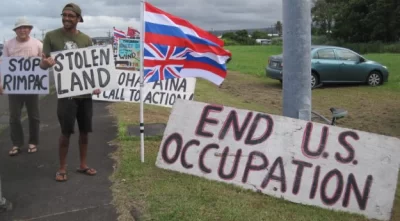A Primer For Those Considering Expatriation
by Adam Taggart, Peak Prosperity:
 Is considering expatriation or foreign citizenship right for you?
Is considering expatriation or foreign citizenship right for you?
A growing number of Americans are frustrated with the way in which their economy has been managed and are becoming increasingly concerned about future measures the government may take to keep its coffers full.
A question that’s arising with increasing frequency is: does expatriation offer a viable protection to those concerned about a more financially intrusive US system?
The answer is ‘yes’, it does offer a completely legal solution for ending your obligation to pay US income, capital gains, and gift taxes on your worldwide income. But it is certainly not for everyone and should only be pursued after lengthy and diligent consideration.
And before you begin dreaming of a tax-free future, you should realize that the United States imposes taxes on a broader basis than any other country. The United States is one of two countries, and is the only major country, that imposes significant income, capital gains, gift, and estate taxes on its non-resident citizens.
In virtually all other countries, individuals end their liability to pay income tax after a sustained period of non-residence, generally one year or longer. But to legally and permanently end U.S. tax liability on their worldwide income, U.S. citizens must also give up their U.S. citizenship and passport. This process is called “expatriation.”
Yes, it’s a radical step. However, if you’re a U.S. citizen, you can make nearly all the preparations for a possible future expatriation without permanently leaving the United States. This is a four-step process:
- Phase 1. Relocate your assets from the United States to other jurisdictions, preferably where the assets won’t be taxed.
- Phase 2. Identify foreign countries where you would consider living,
- Phase 3. Obtain a suitable second passport
- Phase 4. Expatriate—give up your U.S. citizenship and passport
Once you’ve accomplished the first three phases, summarized here in Part I of this report, the final step—expatriation—is much easier than if you’re starting from scratch. Part 2 of this report describes the expatriation process.
Are you a good candidate for expatriation? You are, if:
- You are comfortable living outside the United States, or are already doing so
- Your spouse and children are comfortable living outside the United States, or are already doing so; and
- You have already or can shift most of your income and assets outside the United States.
Phase 1: Relocate Your Assets Outside the United States
With a few exceptions, the Internal Revenue Code imposes taxes on both U.S. source income and foreign source income of U.S. citizens. Non-resident, non-U.S. citizens (also known as “non-resident aliens”) pay tax only on U.S. source income, although some U.S. sources of income (e.g., most capital gains) are tax-free.
To prepare for this more favorable tax treatment in anticipation of expatriation, begin moving liquid assets outside the United States to more tax-friendly jurisdictions. Begin selling assets that can’t be relocated (e.g., real estate) so that you may reinvest the proceeds overseas.
Invest only in countries and investments with which you are comfortable. If you are accustomed to buying and selling U.S. securities, consider using offshore bank or brokerage accounts to target non-U.S. securities. If you are an experienced real estate investor, investigate real estate purchases outside the United States. Keep in mind that a targeted investment or real estate purchase may also qualify you for legal residence in some countries (Phase 2) or even a second passport (Phase 3). If you have substantial domestic investments in precious metals, consider selling those holdings reinvesting the proceeds offshore.
The vast majority of foreign banks and brokerages now refuse to accept U.S. citizen clients, especially U.S. citizens resident in the United States unless the client has a residence permit in the country where the account is opened However, banks and brokerages in a handful of countries still accept new U.S. citizen and resident clients and allow them to purchase non-U.S. securities. A few banks in Austria, the Bahamas, Hong Kong, Liechtenstein, Singapore, and Switzerland are suitable for this purpose. The minimum deposits in these banks start at $250,000. Minimum deposits in offshore brokerages start around $10,000. Fees are much higher for banking services and securities trading than in the United States.
Both the accounts you hold offshore, and the income derived from them must be reported to U.S. authorities. The penalties for failing to make these disclosures are draconian. Consult with an expert familiar with the tax and reporting rules for international investments when you file your annual tax return.
Offshore real estate is a non-reportable asset for U.S. investors if owned individually or jointly with your spouse or other individuals. Income or gain from foreign real estate investment is reportable and taxable. Countries offering first-world infrastructure and where real estate is relatively affordable include Argentina, Australia, Canada, Chile, Ireland, Mexico, New Zealand, Panama, Spain, and Uruguay.
Numerous potential “land mines” exist in offshore real estate investments. Among them are the lack of a multiple listing service in many countries, difficulty in establishing good title, and legal provisions giving squatters the right to live on your property. In virtually all cases, a probate proceeding is necessary to convey foreign property to the beneficiaries of a deceased owner. Retain a knowledgeable real estate attorney in the country in which you purchase real estate to avoid problems.
Phase 2: Identify Foreign Countries Where You Would Consider Living
Once you give up U.S. citizenship and passport, you no longer have the right to live in the United States. You may generally make brief visits, but in most cases, you won’t be able to stay more than approximately four months annually without becoming subject to U.S. tax on your worldwide income based on the IRC’s “substantial presence test” rules discussed in Part 2 of this report. Finding another country to live in is therefore an essential part of any expatriation exit strategy.
Even if you have no plan currently to leave the United States permanently, finding a country that you may wish to relocate to in the future is a prudent safeguard. If economic or political conditions deteriorate in the United States and reach your personal breaking point, having legal residence in a suitable offshore jurisdiction provides a valuable insurance policy.
If you merely want the right to live in another country in the form of a residence permit, but don’t necessary want to be physically resident there, a number of countries can accommodate your needs. These include Belize, Costa Rica, Malta, Mexico, Panama, and Uruguay. In most cases, you can qualify for residence (although not the right to work in the country) by either making an investment or demonstrating a minimum guaranteed pension payment. Residence rights may be purchased in some countries by making an investment of $80,000 or more in real estate or other assets. A guaranteed pension payment of $1,000 or more may also qualify you for residence. In other countries, you may need to qualify on a points system. Some countries have multiple programs to consider.
Phase 3: Obtain a Suitable Second Passport
To end your responsibility to comply with U.S. tax and reporting obligations, you must give up your U.S. citizenship and passport. Without a second nationality in place and passport in hand, however, giving up your U.S. passport would render you a stateless person. Avoid this status, as it makes it difficult or impossible to legally live or travel internationally.
A second passport also conveys numerous other benefits:
- It gives you the right to reside in the country that issued the passport, and possibly other countries. For instance, a passport from a member of the European Union conveys the right to live and work in any other EU country.
- It gives you a way to travel internationally if your primary passport is lost or stolen, or if the issuing government confiscates or refuses to renew it.
- It provides you with the opportunity to travel to countries blacklisted by the government that issued your primary passport. For U.S. citizens, this includes countries such as Cuba, North Korea, etc.
- It avoids disclosing your primary nationality, should you ever need to keep that a secret. This can be useful if you’re ever confronted by militants who oppose the government that issued your primary passport.
You may qualify for a second citizenship and passport by ancestry, marriage, religion, or extended residence in another country. If not, a handful of countries offer “instant” citizenship in return for an investment or contribution. The Commonwealth of Dominica and the Federation of St. Kitts & Nevis are examples of countries with an official, legally mandated, economic citizenship program. (Note: Dominica and the Dominican Republic are different countries.) In all, 13 countries have such programs in effect.
Dominica has one of the least expensive economic citizenship programs. The nationality law of Dominica authorizes the government to waive the normal requirement of seven years of legal residence to acquire citizenship in exchange for a cash contribution or an investment.
There are two options available:
- Contribution option: The minimum contribution for citizenship and a passport is $100,000 for a single applicant. Larger contributions qualify your opposite-sex spouse, your dependent children under 30, and qualified adult dependents to citizenship and a passport. You make the contribution only after the government approves your application. Additional costs come to about $35,000, making the total expenditure for a Dominica passport a minimum of $135,000 for a single applicant. Total costs including all fees for a husband and wife for this option come to about $210,000.
- Real estate option: Alternatively, you may purchase qualifying real estate in Dominica with a minimum value of $200,000. Additional costs come to a minimum of $90,000.
Dominica passport holders can travel without a visa, or obtain a visa upon entry, to nearly 140 countries and territories, including all 28 member countries of the European Union.
The Federation of St. Kitts & Nevis offers three options to obtain economic citizenship.
- A contribution to the Sustainable Growth Fund (SGF). The cost for an individual applicant is $150,000 for an individual; $175,000 for a married couple; and $195,000 for a family of four. Total costs for a husband and wife come to about $210,000.
- An investment of $200,000 into an approved real estate project. You can sell this investment after seven years. Total costs for a husband and wife come to about $305,000.
- An investment of $400,000 into an approved real estate project. You can sell this investment after five years. Total costs for a husband and wife come to about $520,000.
The St. Kitts & Nevis passport provides visa-free entry, or visa upon entry, to nearly 150 countries, including all EU member countries.
Read More @ PeakProsperity.com
Loading...



